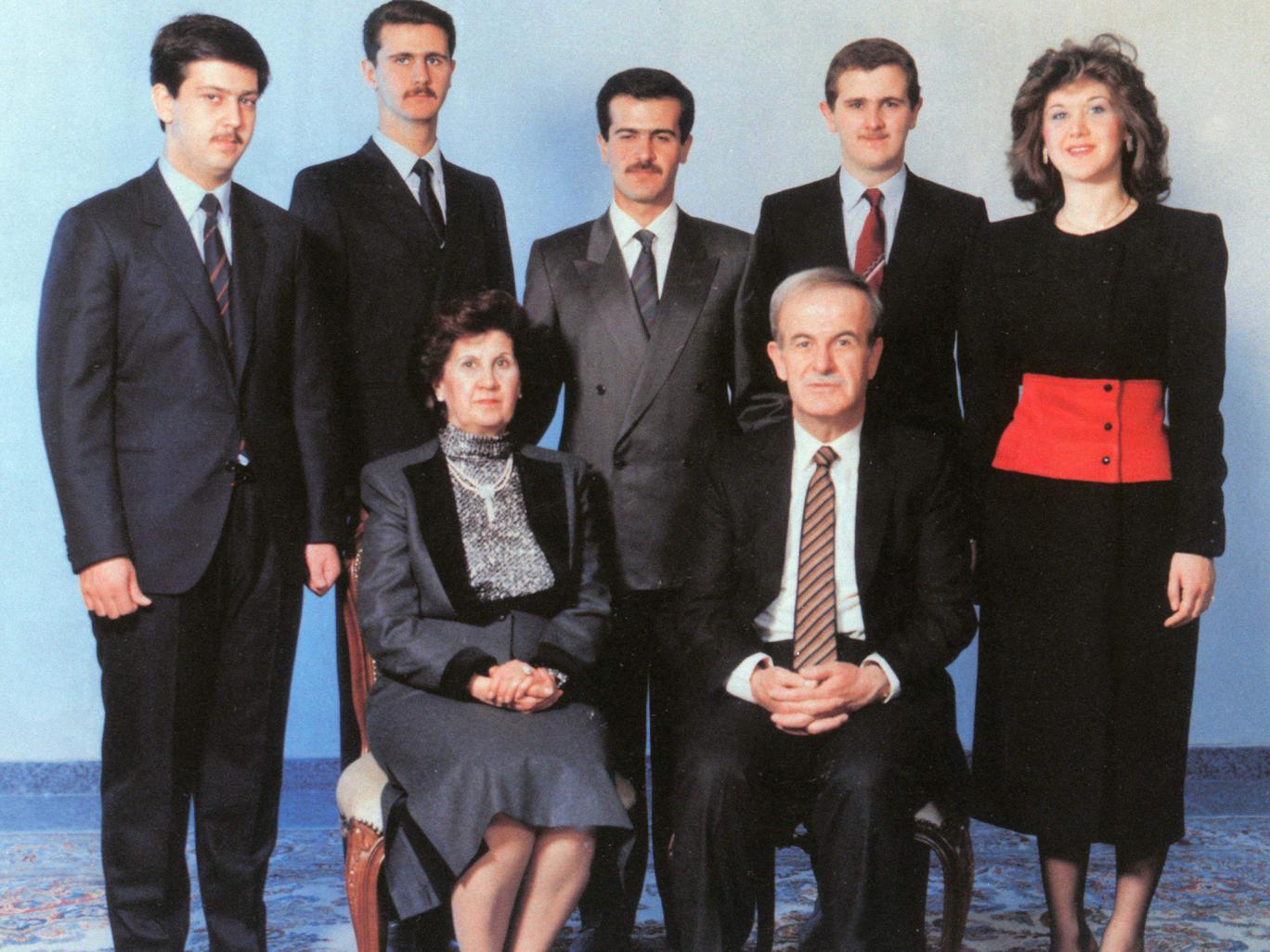
Al-Assad family
The al-Assad family,[a] also known as the Assad dynasty,[1] is a Syrian political family that has ruled Syria since Hafiz al-Assad became president of Syria in 1971 under the Ba'ath Party. After his death, in June 2000, he was succeeded by his son Bashar al-Assad.[2][3][4][5]
"Al-Assad" redirects here. For other uses, see al-Assad (disambiguation).
Al-Assad Family
عَائِلَة الْأَسَد
ʿāʾilat al-ʾAsad
ʿāʾilat al-ʾAsad
The al-Assads are originally from Qardaha, Latakia. They belong to the Kalbiyya tribe.[6] The family name Assad goes back to 1927, when Ali Sulayman changed his last name to al-Assad, Arabic for "the lion", possibly in connection with his social standing as a local mediator and his political activities. All members of the extended Assad family stem from Ali Sulayman and his second wife Naissa, who came from a village in the Syrian Coastal Mountains.[7]
During his early reign in the 1970s, Hafiz al-Assad created patronage networks of Ba'ath party elites figures loyal to his family. Members of Assad family established control over vast swathes of the Syrian economy and corruption became endemic in the public and private sectors.[8] After Hafiz al-Assad's death, family connections continued to be important in Syrian politics. Several close family members of Hafiz al-Assad also held vital positions in the government since his rise to power, an arrangement which exists to the present day.[9][10] Syrian bureaucracy and business-community are also dominated by members of the Assad dynasty and individuals affiliated with them.[11][12]
Hafiz Al-Assad built his regime as a bureaucracy that was marked by a distinct cult of personality, uncharacteristic in modern Syrian history. Images, portraits, quotes and praises of Assad are displayed everywhere from schools to public markets and government offices; and Hafiz al-Assad is referred as the "Immortal Leader" and the "al-Muqaddas (Sanctified One)" in official Assadist ideology. Hafiz re-organised the Syrian society in militaristic lines and persistently invoked conspiratorial rhetoric on the dangers of foreign-backed plots abetted by fifth columnists and promoted the armed forces as a central aspect of public life. Following the death of Hafiz, the personality cult was inherited by his son and successor Bashar al-Assad who is hailed by the party as the "Young Leader" and "Hope of the People". Highly influenced by the model of the North Korean Kim dynasty, official propaganda ascribes divine features to the Assad dynasty; and reveres the Assad patriarchs as the founding fathers of modern Syria.[13][14][15]
Origin[edit]
The Assad family originates from Ali Sulayman al-Wahsh, Hafiz al-Assad's father, who was born in 1875 and lived in the village of Qardaha in the coastal Syrian mountains. The locals reportedly nicknamed him "Wahsh", Arabic for "wild beast", because he was physically strong and a good fighter. Al-Wahsh remained the family name until the 1920s, when it was changed to al-Assad, Arabic for "lion".[16][17] Because of Sulayman's reported strength and marksmanship, he was respected in his village. At the outbreak of World War I, the Ottoman governor of the Aleppo Vilayet sent troops to the area to collect taxes and round up recruits. The troops were reportedly fought off by Sulayman and his friends who were only armed with sabres and old muskets.[18] Because Sulayman was respected, he was a local mediator between quarreling families. He was also one of the local chieftains who were the de facto rulers of the area. The chieftains from the powerful families would provide protection to their neighbours and in return they gained loyalty and respect.[19] He lived until 1963, long enough to see his son's rise to power. He married twice and over three decades had eleven children. His first wife Sa'ada was from the district of Haffeh. They had three sons and two daughters. His second wife was Na'isa, twenty years younger than him. She was the daughter of Uthman Abbud from the village of Al-Qutailibiyah, a dozen kilometres further up the mountain. They had a daughter and five sons. Hafiz was born on 6 October 1930 and was the fourth child.[20]
Al-Assad family is affiliated with the Alawite sect, a syncretic sect with links to early Shi'ism. Since coming to power in 1970, Assad family traditionally used sectarian loyalty from the Alawite sect as a vital component to legitimize their dynastic rule. Many Sunni loyalists have been assigned to crucial posts in the bureaucracy, security forces, military, judiciary, etc. in-order to consolidate Assad family's grip on power.[21]
Anisa's siblings[edit]
Makhlouf family[edit]
The Makhloufs belong to the Alawi Haddad tribe,[57][74] both Hafiz and Rifaat are related through marriage to the Makhloufs. The Makhlouf family rose from humble beginnings to become the financial advisor to Hafiz al-Assad after the former President married Makhlouf's sister. The family headed by Mohammad Makhlouf has established a vast financial empire in the telecommunication, retail, banking, power generation, and oil and gas sectors. The net worth of the family was estimated in 2010 to be at least five billion dollars.[45][75]